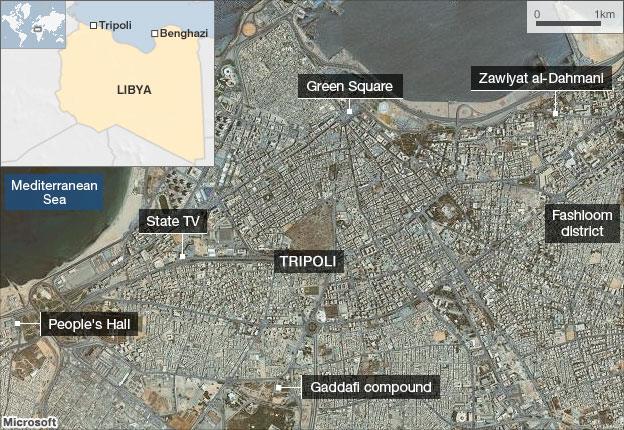Libyan leader Muammar Gaddafi appears on state TV
- Published
Muammar Gaddafi's brief and bizarre state TV appearance
Libya's leader, Col Muammar Gaddafi, has dismissed reports that he had fled amid the unrest sweeping the country, calling foreign news channels "dogs".
Speaking to state TV from outside a ruined building, he said: "I am in Tripoli and not in Venezuela," after rumours that he had flown to Caracas.
Col Gaddafi's statement came after security forces and protesters clashed in the capital for a second night.
The UN Security Council is to meet in closed session to discuss Libya.
UN Secretary-General Ban Ki-moon made the announcement, after speaking to Col Gaddafi on Monday.
"I urged him that the human rights and freedom of assembly and freedom of speech must be fully protected," said Mr Ban.
The Arab League will also hold an emergency session.
Eyewitness reports that military aircraft had fired on protesters in Tripoli have been backed up by Libyan diplomats who have turned against the leadership.
But Col Gaddafi's son Saif al-Islam said the aircraft had been used only to bomb army bases which had defected to the opposition.
The BBC's Jon Leyne, in western Egypt, says the regime now seems to be fighting on multiple fronts, trying to put down the protests and fighting a bitter battle against a growing number of army units that have risen up against the Libyan leader.
Libya's diplomats at the United Nations in New York called for international intervention to stop the government's violent action against street demonstrations in their homeland.
Deputy Permanent Representative Ibrahim Dabbashi said Libyans had to be protected from "genocide", and urged the UN to impose a no-fly zone.
Ali Aujali, Libya's most senior diplomat in the US, also criticised the country's leader. He told the BBC he was "not supporting the government killing its people".
The embassy in Malaysia condemned the government's actions after being briefly occupied by protesters who smashed a portrait of Col Gaddafi.
The ambassador to India said he had quit because of "unacceptable" violence against civilians.
Ali al-Essawi said he had heard from sources inside the country that the leadership had been using African mercenaries to combat the protests, and this had prompted Libyan troops to join the opposition, Reuters news agency reported.
Meanwhile Libyan state TV denied there had been any massacres, dismissing the reports as "baseless lies" by foreign media.
"You should know that this is part of the psychological warfare, lies and rumours which you should resist because they are aimed at demolishing your morale, stability and blessings for which they envy you," a statement said.
"Rumours are a poison which you should not drink. False news peddled by satellite TVs are arrows which you should deflect towards their throats."
'Satisfied'
Col Gaddafi appeared for less than a minute on state television shortly after 0200 local time (0000 GMT) on Tuesday.
He was sitting in the passenger seat of an old, white vehicle and held up an umbrella to shield himself from the rain while speaking.
"I am satisfied, because I was speaking in front of the youth in the Green Square tonight, but the rain came praise to God, it is a good omen," he said.
"I want to clarify for them that I am in Tripoli not in Venezuela. Do not believe these channels - they are dogs. Goodbye."
It has been raining in Tripoli for much of the past two days.
One resident of Tripoli called the comment an insult.
"We thought that he'd just say he was sorry, or that he would just fix [it] or whatever, but something like this? This is insulting," he told the BBC.
Earlier, the newly established General Committee for Defence said its forces would cleanse Libya of anti-government elements.
A statement described the protesters as "terrorist gangs made up mostly of misguided youths", who had been exploited and fed "hallucinogenic pills" by people following foreign agendas.
Bombing raids
Our correspondent says Col Gaddafi has now lost the support of almost every section of Libyan society.
The BBC's Ian Pannell looks at the latest video purportedly showing Libyan protests
Foreign journalists work under tight restriction in Libya, and much of the information coming from the country is impossible to verify.
But the authorities have accepted that eastern cities such as al-Bayda and Benghazi - traditional pockets of resistance to the government - are now under the control of the opposition.
The unrest had not touched Tripoli until Sunday, when hundreds of protesters flooded the streets, only to be suppressed by security forces.
On Monday, state TV reported that a renewed operation had begun against opposition elements.
An eyewitness in the capital said the suburbs of Fashloom and Zawiyat al-Dahmani had been cordoned off by security forces.
Witnesses estimate that more than 50 people have been killed in Tripoli since Sunday.
Before the unrest spread there, Human Rights Watch estimated that 233 people had been killed. Other groups said the figure was much higher.
Libya's most senior diplomat in the United States, Ali Aujali, has criticised Colonel Gaddafi's regime
Amid the turmoil on the streets, senior officials have begun to desert the regime. Justice Minister Mustapha Abdul Jalil quit the government because of the "excessive use of violence", the Quryna newspaper said.
The US joined "international community in strongly condemning the violence in Libya," said US Secretary of State Hillary Clinton.
"Now is the time to stop this unacceptable bloodshed," she added.
EU foreign ministers released a statement condemning the "ongoing repression against demonstrators", and said they deplored the violence and death of civilians.
The violence has helped to push up oil prices to their highest levels since the global financial crisis of 2008.
International firms including BP, one of the world's biggest oil companies, are preparing to pull their staff out.
Thousands of Europeans have already fled the country.
